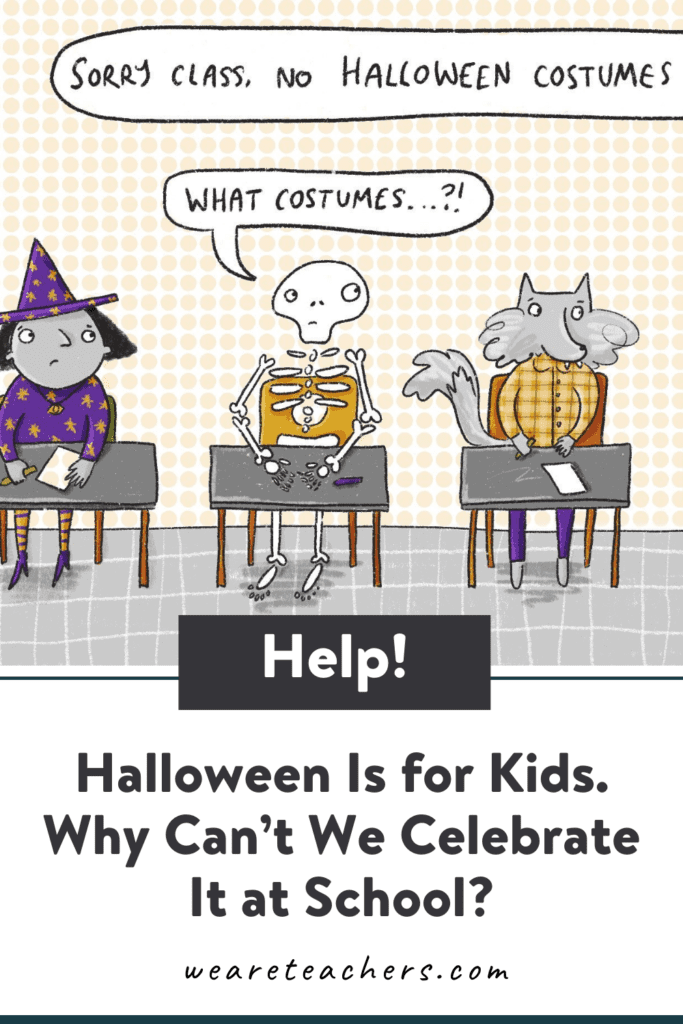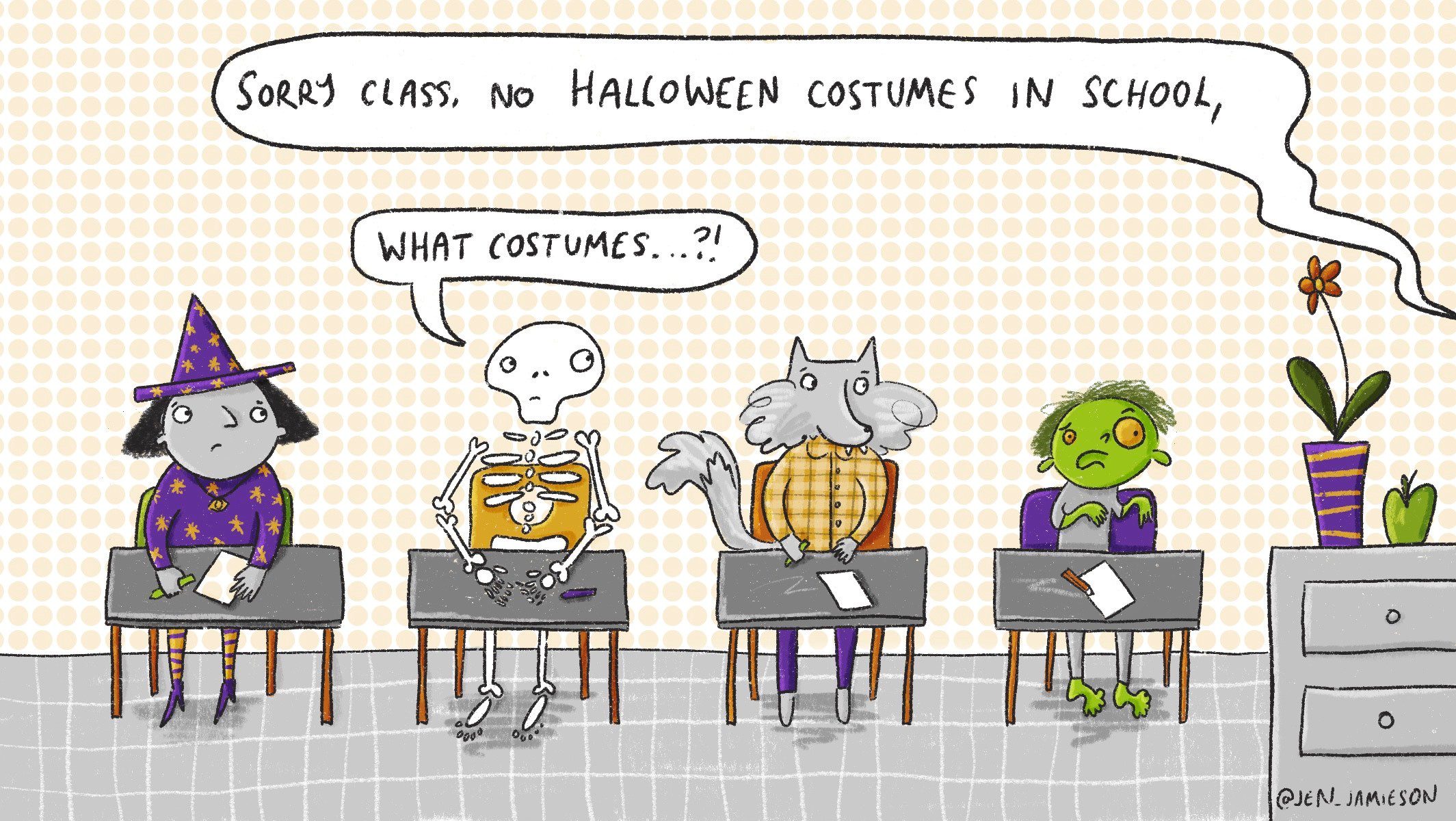Dear WeAreTeachers:
I just learned at a staff meeting there is now a zero-tolerance policy on celebrating any holidays. There will be no more activities or even themed worksheets allowed at our K-3 school. Give me a break. Let these kids be kids. I mean, our school actually has to redo the October calendar because it was a bit ‘Halloweenish.’ That seems so extreme to me. What’s your advice on Halloween at school? —School Should Be Fun
Dear S.S.B.F.,
Thank you for bringing up a topic that can be supercharged for some teachers and families. It’s healthy for us to question policies as well as our very own thinking. My daughters are adults now, and the debate about whether Halloween and other holiday celebrations are appropriate at school has been going on since they were little.
Even though Halloween is often considered a secular holiday, when we dig deeper into the origin of Halloween, we learn it dates back to ancient Celtic fall festivals and was later influenced by the Romans conquering the Celtic territory. With the infusion of Christianity, All Souls’ Day was celebrated with bonfires, parades, and dressing up in costumes such as angels and devils. All Saints’ Day was also called All-Hallows, and the night before, it was called All-Hallows Eve, which became known as Halloween.
Even though Halloween’s origins are not the focus in schools, some families are not proponents. Here’s the thing. About one-third of the U.S. population does not celebrate Halloween. Some families prefer not to have their children participating in Halloween-related activities. As the U.S. population has become more culturally and religiously diverse, equity awareness has increased in schools and beyond. An Assistant Superintendent for Evanston, Ill. schools stated, “While we recognize that Halloween is a fun tradition for many, it is not a holiday that is celebrated by everyone for various reasons, and we want to honor that.”
In the spirit of INCLUSIVITY in education, consider letting Halloween be an at-home experience for those who participate in the activities. There are many alternatives to Halloween that can still be fun for learners. Many educators have shifted to celebrating the seasons. It’s not Halloween per se that makes the learning fun. It’s the culminating sensory, hands-on, social experiences that do.
You sound like a teacher who values making learning fun and engaging. Fun is not fluff like some might think. So, what makes something fun? Take a moment and ask yourself: is fun truly tied to a holiday topic, or is fun a result of varied, interactive, and creative experiences? Many educators argue that the fun factor increases when learning is based on real-life experiences, hands-on learning, and collaboration. Offering choice increases motivation which in turn can make a topic more interesting. Fun is fertile ground for learning!
Dear WeAreTeachers:
I had a student who had a really awful junior year in his personal life, and he failed my U.S. History classes twice. Unfortunately, this student didn’t end up graduating. He’s now in the process of studying for his GED and wants my help. I just can’t do it. Even though he trusts me and appreciates everything I did for him when things were rough, I just can’t spoon-feed the history content for his GED. He isn’t my student anymore or even a student at the school. I tend to be a doormat, and I’m trying to change that. How do I write back and say no without feeling guilty? —My Plate is Full
Dear M.P.I.F.,
You are not a “doormat!” Instead, you are establishing healthy boundaries and promoting student responsibility! You mentioned that this student has had some tough times. And what did you do? You showed up and connected. Marieke van Woerkom spearheads Morningside Center ’s restorative practices and reminds us that “absence of connection can cause distress and disease. Social connection is the antidote and is increasingly seen as a core human need.” You supported your student, and now it’s time to encourage him to take responsibility and build confidence.
The next phase of your support is about communicating your belief in your student’s potential to take control of his life. I reached out to Barbie Magoffin, a teacher at San Diego High School. Barbie is strategic, compassionate, and has titanium-level, strong relationships with her students. She shared, “I would tell the student you’re unable to take on extra things right now, but that you’re so excited to know that he has it under control. ‘What a great opportunity this is to show off how capable you are on your own! I can’t wait to hear how it goes. You got this!'”
As educators, we have a unique opportunity to help cultivate hope in our students. There are two critical components to making hope feel doable and practical. One aspect includes creating pathways. Pathways are plans we make to move through challenges and towards the goals we have. These pathways may include rest stops, detours, and alternatives routes. Remind your student to stay focused on his goal of attaining the GED and to be flexible with how he reaches it. Also, encourage your student to take GED practice tests, since that’s one of the best ways of studying.
Another component of hope is agency. Agency refers to the belief and confidence that learners have in themselves to reach the goals they make for themselves. Students who exhibit agency notice that their current behaviors affect the future. With learner agency, your student is more likely to persevere towards his GED goal even if the pathway is bumpy. Instead of being your student’s tutor and stretching yourself too thin, help him see how far he has come. C.S. Lewis wrote, “Isn’t it funny how day by day nothing changes, but when you look back everything is different.”
Dear WeAreTeachers:
I’ve been at my school for 15 years and have never had anything like this happen. A parent of one of my first graders was upset about my homework policy, supplies, and communication. I asked my principal to be present for our parent conference, which greatly upset the parent. Then I received a threatening text from the parent before our meeting. When I asked my principal to remove the student from my class, my request was ignored. I was told, “You will keep the scheduled conference.” The parent showed up 30 minutes late to the conference and met with the principal before me. They spoke over everything I attempted to say, and one of the parents even SPIT IN MY TRASH CAN four times during the conference. My principal did not back me up, and I am thoroughly disgusted. How should I handle this? — Attacked and Undermined
Dear A.A.U.,
This is an extreme situation! It’s common to meet with families to discuss classroom systems and learn more personal information about their children in order to be responsive to their social and academic needs. And it is UNCOMMON to have parents act rude to the point of spitting four times in the trash can. That sounds so uncomfortable and gross.
It’s understandable that you feel undermined by your principal. I would, too. That lack of support can really trigger feelings of self-doubt that you might have flaring up. Minimally, your principal could make that classroom change occur. It’s disappointing to hear that your voice was disregarded.
Hopefully, you reached out to your union and/or your human resources department to get support with the double whammy you experienced. Trying to wade through the muck on your own isn’t worth it. You aren’t alone! They can help you figure out the steps to get this student into another classroom for this year.
If this student does end up under your wings for the rest of the year, make sure another colleague joins you in any face-to-face interactions that come up. When parent interactions are a major drain, try communicating your ideas to the parents via email. It’s also important for you to have someone join you for principal meetings, too.
Remember what Pema Chodron says. “You are the sky. Everything else, it’s just the weather.” Difficult times pass, and you are vast. Always stand up for yourself and know that you deserve better. In solidarity.
Dear WeAreTeachers:
I’m feeling drained, and I’m thinking of resigning. I’ve been waking up for the past two weeks convincing myself not to put in my two weeks’ notice. But I’m a first-time mom with a one-year-old, and this is only my second year teaching. On top of that, I’m dealing with students being out for two weeks at a time due to COVID or exposure, as well as students who haven’t been in a classroom for a year and a half because they were online. I have such a guilty conscience for feeling this way, especially because if I really do leave at this point, my students and co-workers will suffer. Is there any advice you have for making a decision like this? —Ready to Resign
Dear R.T.R.,
You are describing the way so many educators feel while working for the third school year under COVID conditions. It’s HARD! Author and activist Glennon Doyle yells from the rooftops, “I see your fear, and it’s big. I also see your courage, and it’s bigger. We can do hard things.” Whether you stay in the teaching profession or decide to resign, let those guilty feelings dissolve and dissipate. It’s going to take courage to do what feels right for YOU.
When I ask teachers to describe feelings that are arising for them during this challenging current reality, many say they feel tired, overwhelmed, ineffective, and tired. Did I say “tired” twice? Yes, because many teachers are feeling that tired. Doubly tired. Being a new teacher and a new mama is a lot to manage. But now, in the thick of our global pandemic, it’s exponentially harder.
I was a teacher and new mom just like you. And there were days I showed up to work with stains on my shirt from my leaking breast milk, incomplete lesson plans, and feeling like I was moving through my day in a rushed forgetfulness. I felt scattered, distracted, and not my best. And do you know what made all the difference? Connecting with another working mom on campus. We had each other’s backs, and we helped each other on a daily basis. In fact, over 25 years later, we are still close friends and show up big time for each other. You have to decide what’s best for you, but if you choose to stay in teaching, have courage, be vulnerable, and open up to a warm-spirited colleague. Margaret Wheatly says, “Whatever the problem, community is the answer.”
Elizabeth Scott, Ph.D., describes self-care as “a conscious act one takes in order to promote their own physical, mental, and emotional health. There are many forms self-care may take. It could be ensuring you get enough sleep every night or stepping outside for a few minutes for some fresh air.” According to Scott, there are five types of self-care—mental, physical, social, emotional, and spiritual.
First things first. What are you doing to replenish yourself? How do you fill yourself up? Think of something that makes you feel a sense of surging joy. Gift yourself a personal day to try some doable self-care ideas. Try and make your decision about whether to resign when you have a spacious vibe. Be well one moment at a time.
Do you have a burning question? Email us at askweareteachers@weareteachers.com.
Dear WeAreTeachers:
I teach 7th grade science at my local public school, and I’m so unhappy. It’s only been a little over a month since school started, and I feel so done. It’s October, and it already feels like April. I feel like I’m a bad teacher. I know I’m not, but I keep feeling it every single day. How can I spark my joy in teaching again?
Illlustration: Jennifer Jamieson


